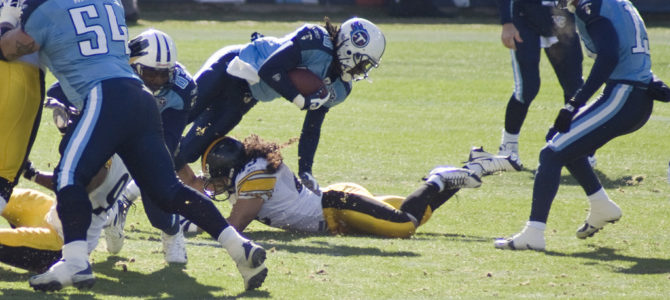
At first glance, football and health care might seem incongruous topics. But the growing focus on athletes—not just professional ones—and brain injuries has drawn widespread public interest. This week’s Wall Street Journal poll found that a 53 percent majority of mothers would encourage their children to play other sports due to concerns about concussions in football, up from 40 percent four years ago.
Into that dynamic stepped six specialists in neuroscience, including several former athletes, for the annual Brain Health Summit hosted in conjunction with the Super Bowl. More than 100 attendees braved a Minneapolis snowstorm (with others watching online) to discuss the increasingly prominent topic. (Full disclosure: I have a longstanding friendship with Nicole Fisher, organizer of the summit and a Federalist contributor, but the views in this post are, as always, mine alone.)
Famed sports agent Leigh Steinberg set the tone, when he discussed the “crisis of conscience” that hit him roughly three decades ago: “I was representing…half the starting quarterbacks in the NFL, and I kept seeing them get hit in the head. And I knew intuitively something had to be wrong with that, but the NFL said, ‘There’s no long-term problem with concussions.’”
He spoke of the first concussion summit he organized in 1994—nearly a quarter-century ago, well before the issue captured national attention—and being branded a “fearmonger” for his efforts to raise awareness.
Despite the recent attention drawn to the relationship between football and concussions, and the obvious Super Bowl connections to the event, most brain trauma occurs well away from the gridiron. Prior to the event, I joked with the crew setting up the lighting that they needed to tape down cords running across the floor, lest someone trip and hit their head at the Brain Health Summit. But the joke has more than its share of reality: Moderator Jessica Schwartz noted that falls represent the leading cause of traumatic brain injuries nationwide.
This year’s summit focused on women, and the effects of brain injuries on all walks of women’s lives. Army veteran Jackie Garrick spoke of her work with women in the armed forces, specifically the psychological impact on veterans returning from the battlefield, which includes delineating between symptoms of traumatic brain injury (TBI) and post-traumatic stress disorder (PTSD). Psychologist Katherine Snedaker spoke of her new initiative, Pink Concussions, that will work with the Veterans Administration to develop a brain bank for women, and encourage women to donate their brains to science. Interesting fact: Becoming an organ donor on a driver’s license does not cover the brain.
As it has across the nation over the past several years, the personal stories of women affected by brain trauma shared at the summit show the issue’s impact on human lives. Former soccer player Rianne Schorel spoke of not understanding the symptoms of concussion syndrome when it first affected her, of playing soccer for three months while suffering effects from brain trauma, and of a seven year bout of post-concussion syndrome.
Alicia Duerson, widow of Chicago Bears safety Dave Duerson, shared some of the details surrounding Dave’s battle with chronic traumatic encephalopathy (CTE). Duerson committed suicide in 2011, just as CTE began attracting national attention, and asked that his brain be donated to science, so others might be spared from the syndrome that plagued the last decade of his life. Alicia powerfully depicted a man with incredible skills and talents away from football—a Harvard MBA graduate, and successful business owner, dead at only 50 years young, with so much potential left unfulfilled.
Despite—and in some ways because of—these heartrending stories, signs of hope abound. Steinberg noted that “there’s now a profit motive in finding solutions,” whether better helmets to protect against hits, better tools to detect concussions, or better drugs and devices to treat the symptoms of brain injuries. Former NFL quarterback Gus Frerotte also appeared at the summit, discussing efforts to create apps that monitor brain health, offering proactive intervention in close-to-real time, rather than only after major concussive events.
Just as important, the national attention on the issue has helped re-orient priorities, discouraging players from trying to “tough it out” and get back on the field. Researcher Gil van Bokkelen, explaining how concussions affect the immune system even after visible symptoms disappear, told how he refused to let his son play hockey for several weeks after clinical symptoms from his concussion ended. It’s an interesting statement, given that New England Patriots tight end Rob Gronkowski will play in Sunday’s Super Bowl only two weeks after suffering a concussion, and three days after clearing the NFL’s concussion protocol.
Fans often try to remind themselves that “It’s only a game.” But those words, coming from the widow of someone who killed himself because of that game, carry a heavy impact. The spotlight generated by events like the Brain Health Summit could help athletes and non-athletes alike, by supporting additional research and raising awareness among the public of the long-term consequences of brain trauma. No sport is worth dying for—and with better understanding, diagnosis, and treatment, hopefully no one will have to.
Mr. Jacobs is founder and CEO of Juniper Research Group, a policy consulting firm. He is on Twitter: @chrisjacobsHC.









